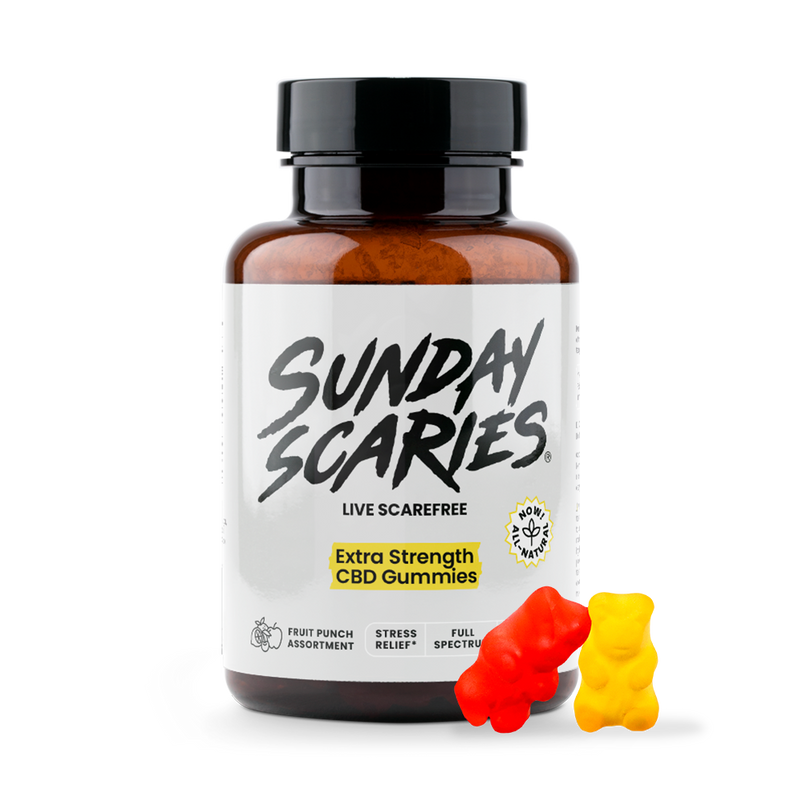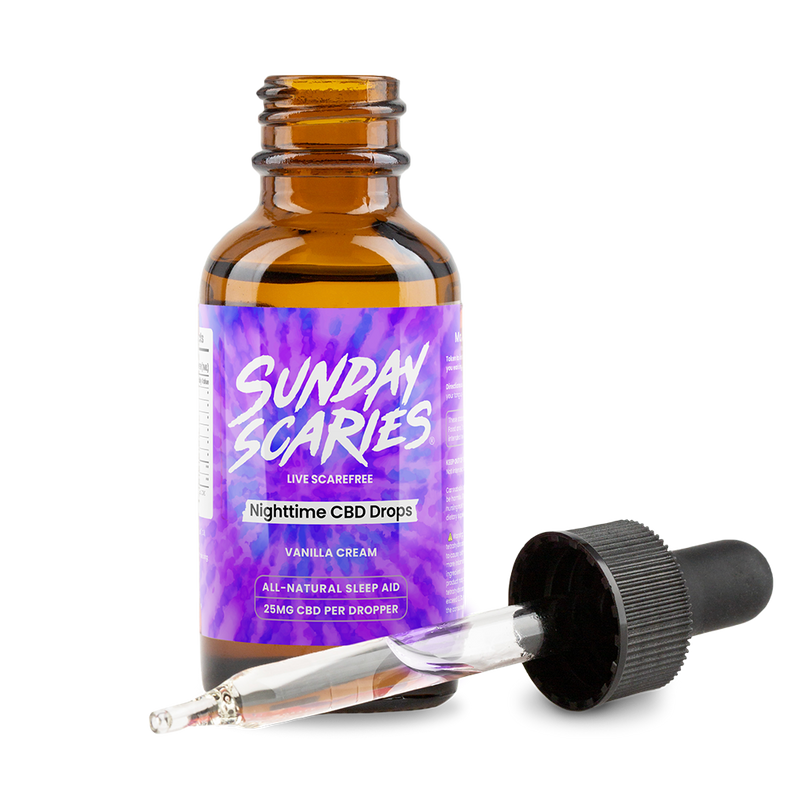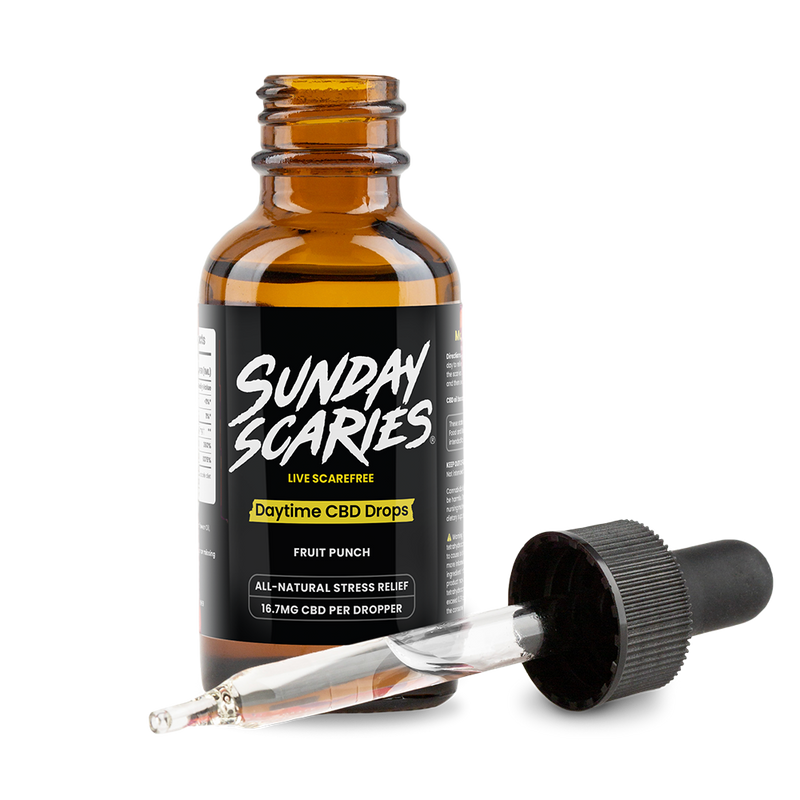
CBD Oil vs Hemp Oil: Understanding the Benefits and Differences
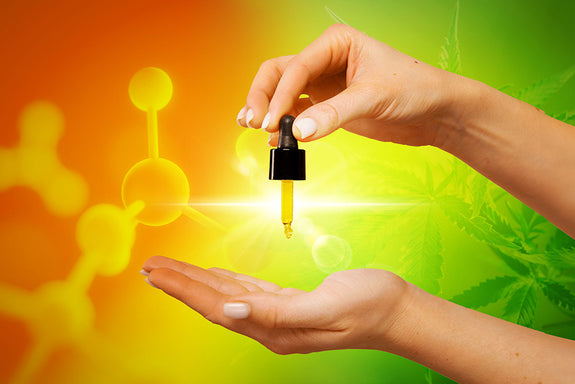
Confused about 'cbd oil vs hemp seed oil' or ‘cannabidiol vs hemp oil’? You'll be happy to know from the beginning that these questions are referencing the same two things.
Quickly discover their distinct purposes: CBD oil, a non-psychoactive extract from the hemp plant’s leaves and flowers, offers potential therapeutic benefits.
In contrast, hemp oil comes from the seeds and is prized for its nutritional content. This article will guide you through their unique advantages and applications.
Key Takeaways
- CBD oil is made from the leaves, stalks, and flowers of the hemp and marijuana plants, it doesn’t produce a ‘high’ and is being explored for health benefits like reducing pain and inflammation due to its interaction with the body’s endocannabinoid system.
- Hemp oil, extracted from the seeds of the hemp plant, is rich in nutrients like Omega-3 and Omega-6 fatty acids and is used both as a dietary supplement and in industrial applications, but it does not contain CBD or the same therapeutic properties attributed to CBD oil.
- While both CBD oil and hemp oil are generally considered safe, understanding their uses, benefits and potential side effects is important for consumers.
Cannabidiol Explained: What is CBD Oil?

CBD oil, also known as cannabidiol oil, is derived from the leaves, stalks, and flowers of both hemp and marijuana plants and is a non-psychoactive compound. It has garnered significant attention for its potential health benefits and therapeutic uses.
But how does it work?
CBD oil engages the endocannabinoid system in our bodies, a system responsible for regulating various bodily functions including:
- Appetite
- Mood
- Memory
- Sleep
- Immune response
Such interaction influences inflammation, pain, and mood disorders, suggesting CBD oil’s promise as a natural remedy for these conditions.
While CBD oil and hemp seed oil share similar origins, they have different properties and benefits.
The main difference lies in the parts of the plant they are derived from and their cannabinoid content.
CBD oil comes from the plant’s leaves, stalks, and flowers, which are rich in CBD, whereas hemp seed oil is extracted from the seeds, which contain little to no CBD.
The Extraction Process of CBD
CBD is extracted through either pressurized carbon dioxide or a method referred to as cold pressing. Carbon dioxide extraction involves leveraging pressurized CO2 to pull CBD from cannabis sativa at certain temperatures. This method ensures precise and controlled extraction, preserving the beneficial properties of CBD and preventing the transformation of cannabidiol into a highly concentrated form.
However, it comes with its drawbacks, including high costs and potential loss of terpenes and minor cannabinoids that are natural in cannabis plants.
In contrast, cold pressing employs machines to pulverize the hemp into a pulpy mash, all the while maintaining a frigid state to retain the nutrients. This method is commonly used for producing hemp oils.
The quality and composition of CBD extract can vary depending on the extraction method employed, as different methods yield different degrees of quality and composition.
The Role of Carrier Oils in CBD Products
Carrier oils are essential in CBD products. These oils aid the body in absorbing and processing CBD oils. Commonly used carrier oils in CBD products include:
- MCT oil
- Avocado oil
- Hemp seed oil
- Grape seed oil
- Coconut oil
- Olive oil
- Sunflower oil
Each of these oils plays a unique role in enhancing the absorption and efficacy of CBD within the body.
For example, MCT oil boosts both the absorption and efficacy of CBD in the body, thus promoting cardiovascular health.
Coconut oil has antimicrobial and anti-inflammatory properties.
Olive oil is rich in antioxidants and has a high concentration of oleic acid.
Hemp seed oil, which is rich in omega-3 and omega-6 fatty acids and has a nutty flavor.
MCT oil, which is easily digestible and can increase the absorption of CBD.
Sunflower oil assists in soothing and healing the skin, decreasing dryness, and fostering healthy skin. It’s abundant in Omega 6 acid, which possesses anti-inflammatory properties, and is packed with vitamins and omega fats, making it a great carrier oil for both CBD products and hemp seed oil products.
Hemp Oil Uncovered: More Than Just a Seed Extract

Derived through the cold-pressing of hemp seeds, hemp oil is esteemed for its nutritional properties and various industrial uses. It’s renowned for its remarkable nutritional composition, particularly its abundance of vitamins, minerals and substantial levels of essential fatty acids such as Omega-3 and Omega-6.
Beyond its dietary advantages, hemp oil is employed in various applications, including industrial manufacturing processes and the creation of environmentally friendly products such as paints and bio-plastics.
Despite being extracted from the same plant species, hemp oil differs from CBD oil in its cannabinoid content and uses, as we’ll explore in the next section.
Varieties of Hemp Oil Uses
Hemp oil isn’t just for consumption; it is also utilized in the manufacturing of paints as a natural binder, aiming to achieve a finish similar to that of linseed oil, recognized for its safe and sustainable properties.
Its use doesn’t stop there. Dietary supplements containing hemp oil include hemp seed oil capsules, hemp oil softgels, and hemp oil blends with other active ingredients.
Hemp oil’s versatility extends to the culinary world too. It can be used in various ways, such as:
- Salad dressing
- Roasting potatoes and vegetables
- Soups
- Stir-frying
- Quinoa bowls
- Preparing hemp pesto
However, caution should be exercised when using it for cooking due to its low smoke point.
The Nutritional Profile of Hemp Seed Oil

Hemp seed oil, also known as dietary hempseed oil, is a nutritional powerhouse. It contains a significant amount of omega fatty acids, specifically omega-3 and omega-6, such as alpha linolenic acid (ALA) and stearidonic acid.
In addition to being high in omega fatty acids, hemp seed oil also contains vitamins E and other minerals, making it one of the most beneficial seed oils available.
Compared to other popular oils such as olive oil, hemp seed oil contains 25 times more omega fatty acids and is free of trans fats and has 40% less saturated fat.
However, unlike fish oil, which is abundant in EPA and DHA, hemp seed oil predominantly contains omega-3 fatty acids in the form of ALA.
Decoding the Differences: Cannabidiol vs Hemp Oil
Further examination of the differences between CBD oil (Cannabidiol) and hemp oil (hemp seed oil) reveals that their unique features stem from their extraction processes and potential health benefits. CBD oil, derived from the flowers, leaves, and stems of the cannabis plant, is rich in CBD and is recognized for its potential health advantages and therapeutic uses.
On the other hand, industrial hemp oil, predominantly comprising extracts from hemp seeds, is esteemed for its nutritional value.
Psychoactive Properties: Hemp Oil's Lack Thereof
Psychoactive substances alter mental processes by modifying brain function, impacting perception, consciousness, mood, and behavior. THC, the primary psychoactive component in cannabis, activates the brain’s pleasure-responsive region, leading to alterations in perception, elevated heart rate, exacerbation of mental health symptoms, and a heightened risk of substance misuse.
Yet, hemp oil does not possess the psychoactive traits linked to THC. It contains little to no THC, making it non-psychoactive and safe for consumption without the risk of inducing a high. In fact, hemp seed oil contains much less than 0.3% THC legal limit.
Therapeutic Applications: Cannabidiol's Impact on Health

CBD oil has gained prominence in recent years for its potential benefits in addressing a host of health conditions. It has been the subject of research for its potential benefits in addressing pain, inflammation, anxiety, depression, and other health conditions.
It exerts its effects in the body by interacting with the endocannabinoid system, specifically by activating two of its core receptors, CB1 and CB2, playing a role in regulating mood, temperature, cognitive function, and muscle repair.
Pure CBD alone will not get you high, although CBD comes in three different forms: Full Spectrum, Broad Spectrum and Isolate, and Full Spectrum contains traces of THC.
Skin Health: CBD for Dermatological Treatment
CBD oil isn’t limited to internal use; it’s also great for the skin. It is capable of helping skin conditions like eczema, dermatitis, and psoriasis because of its anti-inflammatory properties, which enable it to decrease inflammation and provide relief to the skin.
CBD oil possesses anti-inflammatory and antioxidant properties that can deliver beneficial pharmacological effects, including neuroprotective effects, which are especially advantageous in skincare.
For skin treatments, gently apply a topical CBD cream or lotion in a circular motion as per the instructions given by the product manufacturer.
Hemp Oil's Role in Wellness and Nutrition

Hemp oil contributes to wellness and nutrition in several ways. This oil provides omega-3 fatty acids, aiding in lowering blood pressure among those with hypertension. Hemp oil also has the ability to modulate immune function due to its anti-inflammatory properties, which may lead to a decrease in swelling within the body and consequently enhance the responsiveness of the immune system.
It’s also acknowledged for its anti-inflammatory properties, potentially assisting individuals dealing with painful infections, autoimmune disorders, or physical injuries.
Hemp Oil in Culinary Creations
Hemp oil’s versatility in the kitchen is one of its many appeals. It’s one of the healthiest oils, abundant in omega-3, omega-6, and omega-9 fatty acids, which promote heart health, reduce inflammation, and enhance brain function.
It also contributes a delightful light nutty and refreshingly earthy flavor to dishes, particularly enhancing dishes featuring nuts or vegetables, and excelling in salad dressings. However as discussed, due to its low smoke point, it’s recommended to be used at temperatures up to 330°F.
Safety and Side Effects: What You Should Know
Just like any product, understanding the potential side effects and safety measures is vital. The combination of hemp oil and CBD oil is generally considered safe for consumption. However, larger studies involving Epidiolex, a CBD drug for epilepsy, did find some side effects.
These side effects were reported in the studies and include dry mouth, appetite suppression and lethargy. The FDA has also cautioned about potential risks associated with the use of CBD, emphasizing the need for further research on:
- Long-term effects
- Dosage thresholds
- Methods of consumption
- The impact on developing fetuses and the brain.
For safe usage, it’s paramount to trust the source, double-check accurate labeling, and verify that the product meets manufacturing standards.
Personal Care and Beauty: Hemp and CBD in Topical Products
The benefits of hemp and CBD oil extend to the realm of personal care and beauty.
Incorporating hemp oil into skincare products offers numerous advantages, such as:
- Moisturizing and soothing the skin
- Anti-aging properties
- Anti-inflammatory effects
- Improvement of skin elasticity and tone
- Reduction of acne and skin conditions such as eczema and psoriasis
Similarly, CBD oil has been promoted as a topical application that can offer benefits for skin health, such as:
- Reducing redness and reactivity
- Increasing hydration
- Aiding with skin conditions like eczema, psoriasis, and acne
Summary
To wrap up, both CBD oil and hemp oil serve unique purposes, offering a wealth of potential health benefits.
Whether you’re looking for a natural remedy for stress or body aches, a nutrient-dense oil for cooking, or a skincare staple, these oils have you covered.
Remember, it’s important to understand the differences between these oils, their potential side effects, and respective legal statuses to make the best decision for your health and wellness needs.
Frequently Asked Questions
Is hemp oil the same as cannabidiol?
No, hemp oil is not the same as cannabidiol (CBD) oil. Hemp oil is made from hemp seeds and contains little to no CBD, while CBD oil is extracted from the leaves, flowers, and stalks of the Cannabis sativa plant.
Is hemp oil the same as hemp seed oil?
Yes, these terms are used interchangeably to represent the oil that comes from cold pressed hemp seeds. They differ from CBD, or cannabidiol.
Which is best CBD oil or hemp seed oil?
CBD oil is best for stress relief and sleep aid, while hemp oil offers more nutritional benefits. For pain relief, CBD oil is the recommended choice, although hemp oil may also help but to much lesser degree.
Can you get CBD from hemp oil?
Hemp oil contains little to no CBD, as it is made from cold-pressing hemp seeds, while CBD oil is extracted from the leaves, flowers, and stalks of a hemp plant. Therefore, you cannot get enough CBD from hemp oil.
Are CBD oil and hemp oil psychoactive?
No, both CBD oil and hemp oil are non-psychoactive due to their low THC content, making them safe for consumption without the risk of inducing a high.
Ready to fight the Sunday Scaries? Shop our CBD Gummies for Focus, CBD Candy, CBD Treats for Dogs, CBD Gummies, CBD Oil Tinctures, CBD Sleep Oil, Extra Strength CBD Gummies, Delta-9 THC Gummies, CBD Edibles, and Vegan CBD Gummies online today!

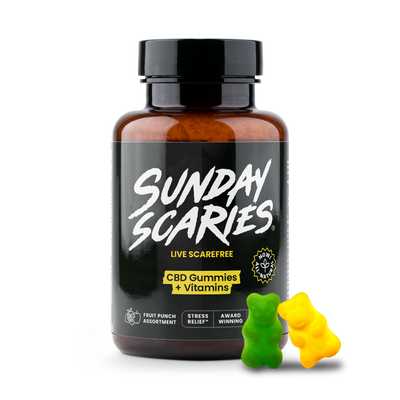 CBD Gummies
Stress Relief
CBD Gummies
Stress Relief
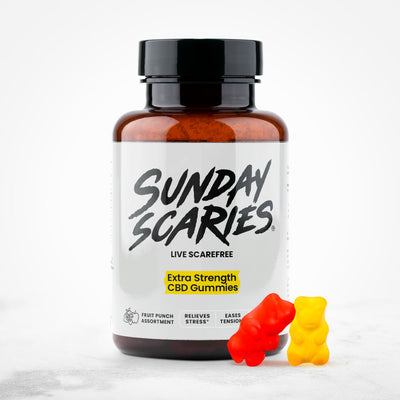 Extra Strength CBD Gummies
Stress Relief
Extra Strength CBD Gummies
Stress Relief
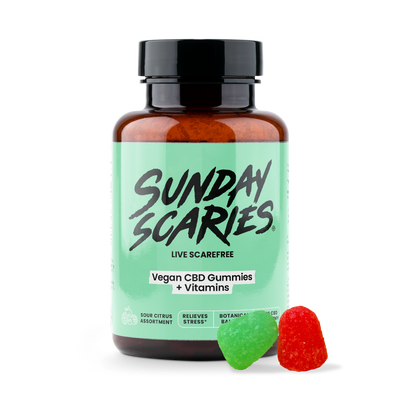 Vegan CBD Gummies
Stress Relief
Vegan CBD Gummies
Stress Relief
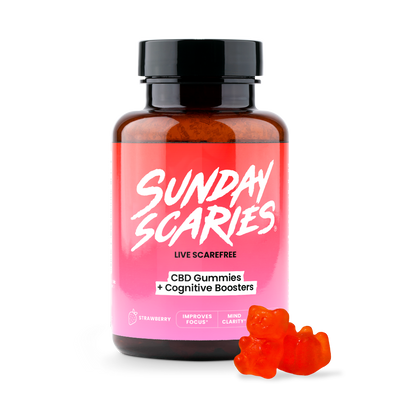 CBD Gummies for Focus
Focus Boost
CBD Gummies for Focus
Focus Boost
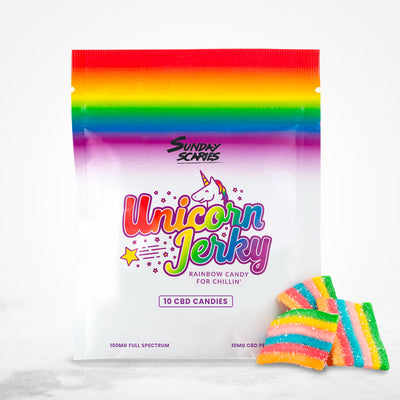 CBD Candy
Mood Lift
CBD Candy
Mood Lift
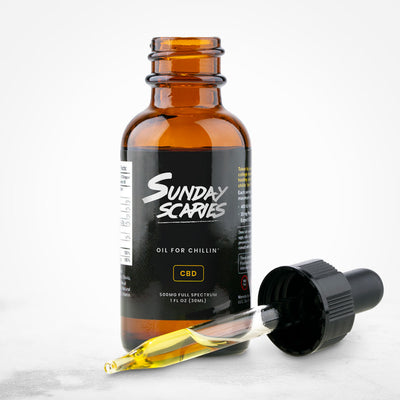 CBD Daytime Oil
Stress Relief
CBD Daytime Oil
Stress Relief
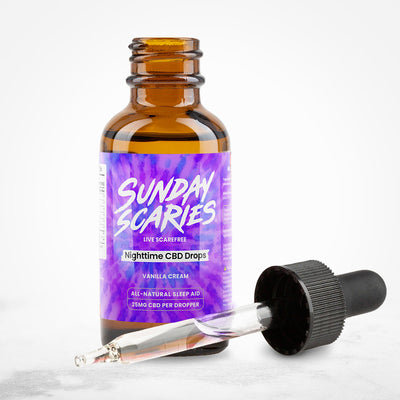 CBD Sleep Oil
Sleep Aid
CBD Sleep Oil
Sleep Aid
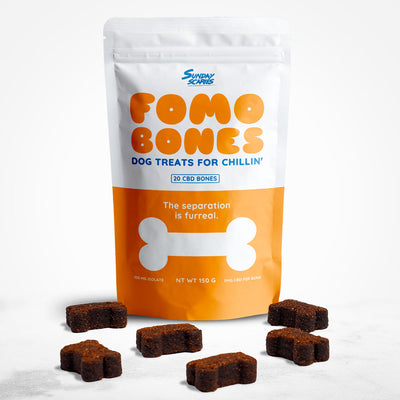 CBD Dog Treats
Stress Relief
CBD Dog Treats
Stress Relief
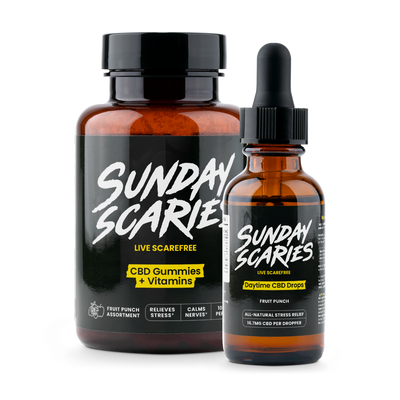 Side Piece Bundle
Stress Relief
Side Piece Bundle
Stress Relief
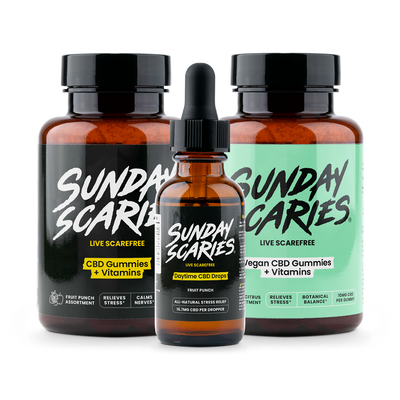 Rando Bundle
Stress Relief
Rando Bundle
Stress Relief
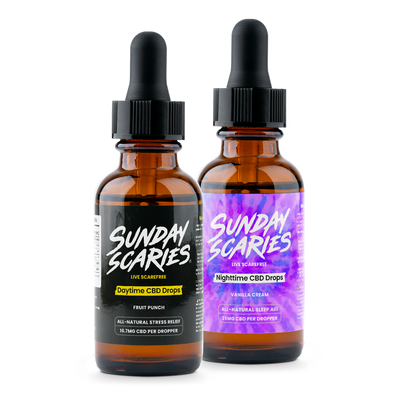 Sunrise & Sunset CBD Oil Bundle
Stress Relief
Sunrise & Sunset CBD Oil Bundle
Stress Relief
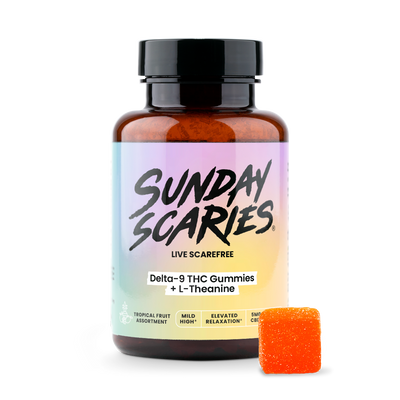 5mg Delta-9 Gummies
Euphoria
5mg Delta-9 Gummies
Euphoria
 10mg Delta-9 Gummies
Euphoria
10mg Delta-9 Gummies
Euphoria
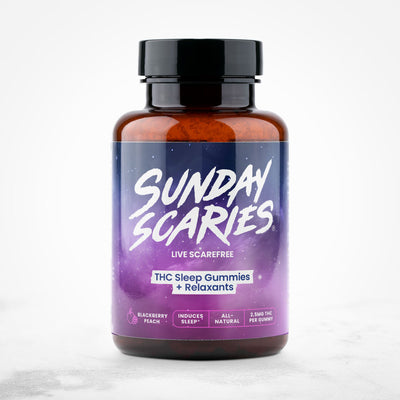 THC Gummies for Sleep
Sleep Aid
THC Gummies for Sleep
Sleep Aid
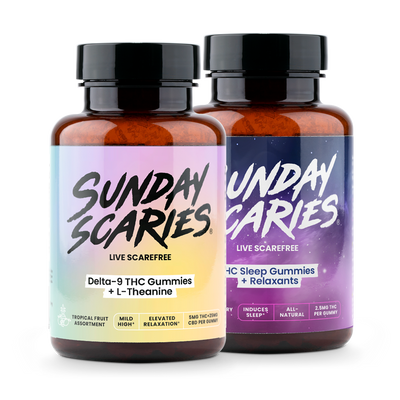 Day & Night THC Gummies Bundle
Stress Relief
Day & Night THC Gummies Bundle
Stress Relief
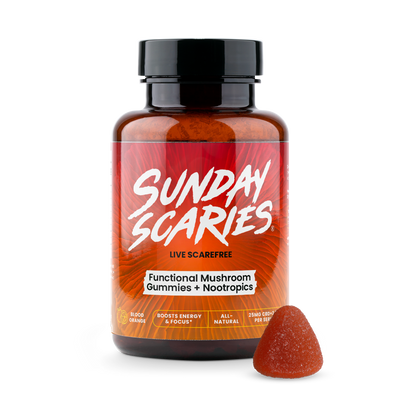 Mushroom Gummies
Focus Boost
Mushroom Gummies
Focus Boost
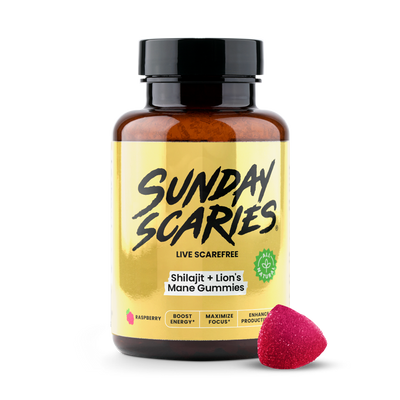 Shilajit Gummies
Focus Boost
Shilajit Gummies
Focus Boost
 Sunday Scaries Hat
Sunday Scaries Hat
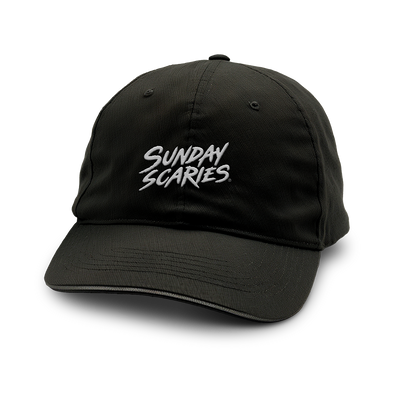 Sunday Scaries Dad Hat
Sunday Scaries Dad Hat
 Sunday Scaries T-Shirt
Sunday Scaries T-Shirt
 Sunday Scaries Pocket Tee
Sunday Scaries Pocket Tee
 Sunday Scaries Tank Top
Sunday Scaries Tank Top
 Sunday Scaries Sweatshirt
Sunday Scaries Sweatshirt
 Sunday Scaries Blanket Jacket
Sunday Scaries Blanket Jacket
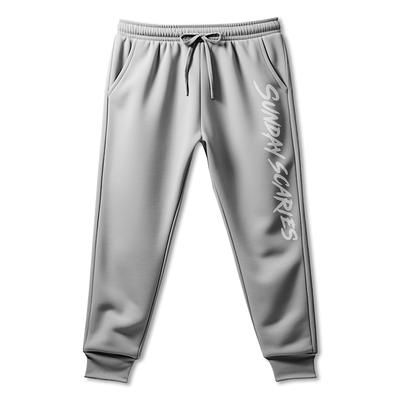 Sunday Scaries Sweatpants
Sunday Scaries Sweatpants

